We found Kirollos and his wife Batoul standing by the door of the prayer hall where the bomb detonated. Batoul, 27, had blood all over the palm frond she was holding in celebration of Palm Sunday. She attends prayers at to this cathedral sometimes, but on the day of the attack she was elsewhere.
"My husband was passing by the church, saw the explosion and phoned to tell me about it," she told Ahram Online.
The bomb exploded inside the prayer hall of St George's Cathedral in the Delta city of Tanta on Palm Sunday morning, killing at least 28 and injuring 78 others, according to the health ministry.
"I arrived at 10 am," Batoul said. "It was crowded, and there was blood and remains everywhere: on benches, the walls and the ceiling of the church. All the paintings were splattered with blood and the seats down the left-hand side were broken, as well as the sculptures and the glass windows of the second-largest church in the city. A bomb was dismantled by security forces in the same church last week."
She said the security forces must bear responsiblity for allowing the attack to take place; while the street outside the cathedral was blocked by security personnel at both ends, Batoul claims that not everyone entering the street was being searched.
The head of the Gharbiyah security directorate, Hossam Khalifa, was sacked following the Tanta attack
"I came here to be in a place of a blessings where the martyrs died. We are holding palm fronds and we are attacked with bombs," she said.
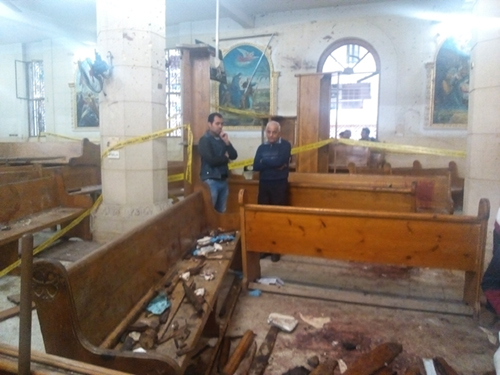
Mourning inside the damaged church of Mar Girgis Cathedral in Tanta.
(photo: Hadeer El-Mahdawy)
However, she said she's not concerned for the ultimate fate of the victims: "They died while praying; they were peaceful, and they went to a better place. I wish to be like them."
We found Kirollos Abdel Sayed, an engineer, sitting down nearby, clearly in a shock.
He entered the cathedral right after the explosion and helped carry the bodies of the dead and injured for hours.
"I'm sure there are more than 30; we carried more than that. The men's section [of the hall] is completely destroyed. Most of those who died were men, but I carried kids too," he said.
Abdel Sayed said that people attend churches prepared to die.
"With explosions, our faith is strengthened. We will stay in our churches. I'm sad, because they ruined the joy of our prayers. They killed people who didn't anything wrong. I knew many of those who died," he said.
Several hours after the Tanta attack, 18 civilians and police personnel were killed in a second attack, this time in Alexandria. A suicide bomber blew himself up outside St Mark's Coptic Orthodox Cathedral, as the head of the church, Pope Tawadros II, led the service inside.
By Sunday afternoon, Ansar Bait Al-Maqdis, the Egyptian affiliate of the Islamic State group, had claimed both church attacks.
A city in worry and grief
Through the two-hour microbus journey from Cairo to Tanta, both the driver and passengers discussed the attack and its aftermath. The cafes close to the microbus station in the city center searched people as they entered, not allowing anyone inside with a large bag. Taxi drivers didn't want to go to the area of the attack and barely agreed to drop us nearby.
It was raining and the weather was cloudy, reflecting the mood of the city.
With so many people feeling angry and sad, journalists were not particularly welcome at the scene of the attack. Both Muslims and Christians lost friends and relatives in the attack, and a large crowd had gathered around the cathedral, waiting for developments.
There was a heavy security presence inside the cathedral and nearby, but it seemed nobody was being searched. People were angry with the security personnel for not stopping the attack, accusing them of failing to secure a Christian place of worship on a religious holy day.
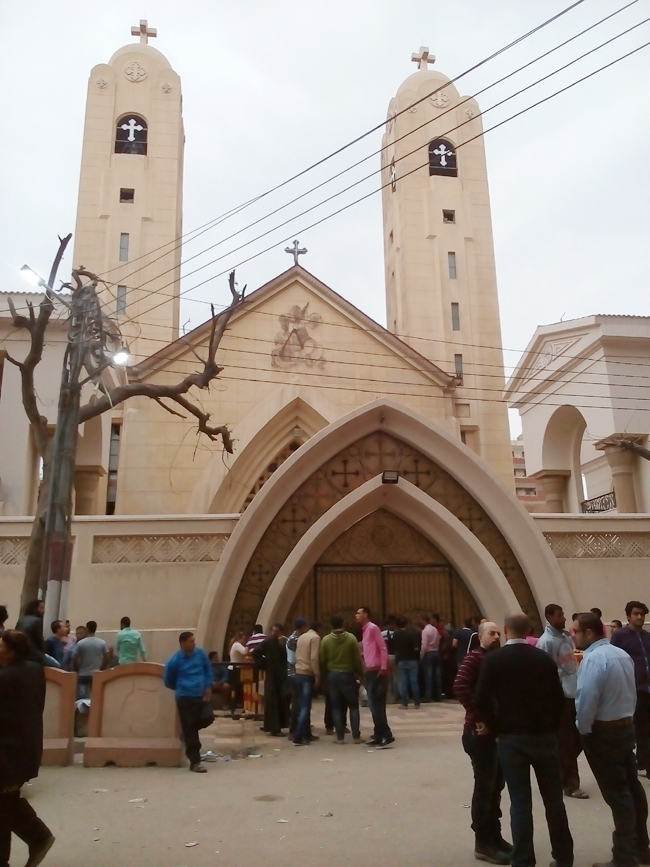
A crowd of Muslims and Christians lost friends and relatives in the attack, gathered outside the Mar girgis Cathedral
(Photo: Hadeer El-Mahdawy)
Three young girls wearing black and sitting in the crowd refused to talk to us. They suggested instead that we go to the hospitals to see the severely injured casualties.
"All of our friends died, and that's all," said one of the girls.
In front of the cathedral, a lady was shouting, calling on the people to join her in chanting "Long live Egypt!"
The woman, named Hoda Mickail, described herself as an ambassador for international peace. However, she was clearly angry at the tragedy that had befallen "our church and our neighborhood."
"I want to say one thing: it's a failure of security," she said. "What are the security people doing here? How did the bomb enter the church from the street?"
Not far away, another woman was angry at events. A local resident, Hanna heard the explosion from her home. She said was lucky to be alive, as she and her son were late for prayers at the cathedral that day.
"I don't understand either politics or religion; we do not know. But we do know that there are machines that can detect explosives, and there are police dogs," she said.
"Today is Palm Sunday, and at 10 or 11 am you should not be able to enter this church from the crowd. Whose fault is that? The security people's or our children's? They should have secured the place from 7 am, when people started arriving at the church."
President Abdel-Fattah El-Sisi declared a three-month state of emergency nationwide on Sunday after the twin bombings that hit dathedrals in Tanta and Alexandria, killing 45 people in total. The combined attacks are the biggest on Egypt's Christian community in recent years.
However, they follow a similar attack on 11 December last year that left 29 dead and more than 40 wounded. On that occasion, a suicide bomber set off an explosion at St Peter and St Paul’s Church in central Cairo, with the Islamist State militant group later claiming responsibility.
In a video released by Islamic State militants in February, the group threatened more attacks against the country’s Christian community.
The 20-minute video, titled Fight All Idolaters, purportedly showed the last statements made by the suicide bomber responsible for the attack in December.
The militant group also recently launched an armed campaign against Christian residents of North Sinai governorate, forcing dozens of families to leave their homes and flee to other governorates.
An old lady standing with her daughter told Ahram Online that two of her relatives were among the vitims on Sunday.
"I have Baula in the ICU. He has two kids and he's a deacon. He was injured in the head, and he's is in the University Hospital," said the lady.
"Also, my relative Dr Anwar, who was also a deacon, died, leaving a girl. They come early to the church. Deacons are the ones who died. A son of our Reverend Daniel was also killed."
"Please pray for them all. They are all our children," the old woman concludes, adding that she will be coming to the same church again next Sunday.
The bombings took place on Palm Sunday, the start of Holy Week, which builds up to Easter Sunday, on which Christians celebrate the Resurrection of Christ.
Displays of solidarity
The Palm Sunday attacks have prompted expressions of both condemnation and solidarity from the international community. Displays of solidarity were also evident in the area around the attack, with locals seeking to offer moral support to those affected.
Om Karima, a street vendor selling vegetables close to the cathedral, heard the explosion from the market where she works.
She told Ahram Online, "Om George is one of my neighbours. Her son died in the explosion. I went to her house to express my condolences. She took care of my kids when my husband died. I'm so sad for her, and that is why I'm here."
Mahmoud, an 18-year-old high-school student, was passing by the cathedral with his classmate when the bomb went off. His classmate was knocked down by the power of the blast and has had surgery on his injured hand.
Mahmoud said, "This is a terrorist attack. They recruit young kids to carry out these terrorist actions because they're poor and they don't know anything."
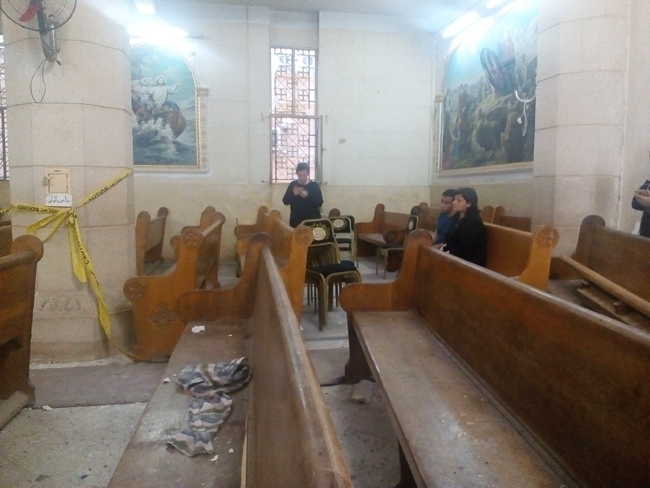
People sitting among the ruins of the attacked Tanta church, praying, and wearing black. (Photo: Hadeer El-Mahdawy)
Another teenager, Mohamed, said that his friend Anton was praying in the church and was injured in the blast.
"No Christians came to the private lesson we had today," said Mohamed, "and we still don't know what happened to many of our classmates who were praying in the church today."
Mahmoud added that such attacks are new to Tanta.
"Our families don't want us to go out of our houses because of these explosions. But if all the churches were attacked, we will pray together in the mosques, and if the mosques are also attacked, we will pray in the street."
A devastated church
It was difficult gaining access to the prayer hall, and none of the priests were willing to talk to us. Grief-stricken people were trying to enter the prayer hall to pray for the dead, but the police were keeping them out.
Finally gaining access to the hall, we saw the extent of the damage and clear evidence of carnage, with benches piled up and wreckage on the floor. Police investigators were hard at work collecting evidence in the case. Church workers were helping the police or clearing up the glass outside. Many others were just sitting among the ruins, crying and praying, wearing black.
The scene inside was similar to the December terrorist attack; the clocks had broken at the time of the explosion, stopping at 9:05 am.
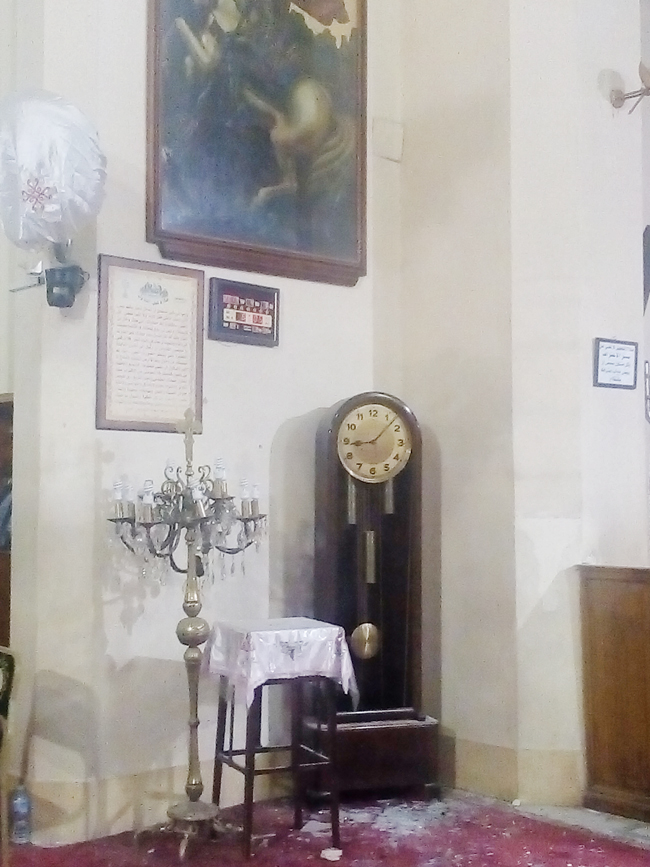
The church clocks had broken at the time of the explosion, stopping at 9:05 am. (Photo: Hadeer El-Mahdawy)
One woman told Ahram Online that she was at the Tanta cathedral at the time of the attack but was in a different hall. She heard the sound of the blast but didn't realise how serious it was until smoke began to fill the hall she was in.
"People were suffocating. Some left the church, but other people refused to leave and prayed. We were in another room. I saw people covered in blood, and I was walking on glass everywhere."
Atef Nemr, one of the church volunteers responsible for ushering duties, was holding small fragments from the explosion that he had collected in the morning.
Nemr told Ahram Online, "Some of my colleagues were killed and some were injured. I was not in the hall. When I heard the explosion I entered the hall. I saw the remains of my colleagues everywhere. We have been searching for the remains of the bodies in the church since the morning".
"This is a dispicable attack," he said. "There should have been security searching everyone entering. But this did not happen, and people are gone. Every time we have a feast, we have victims. We need the police to be more careful and pay more attention."
As Nemr spoke, volunteers were already sweeping the steps of the main hall in preparation for the burial service later that day.
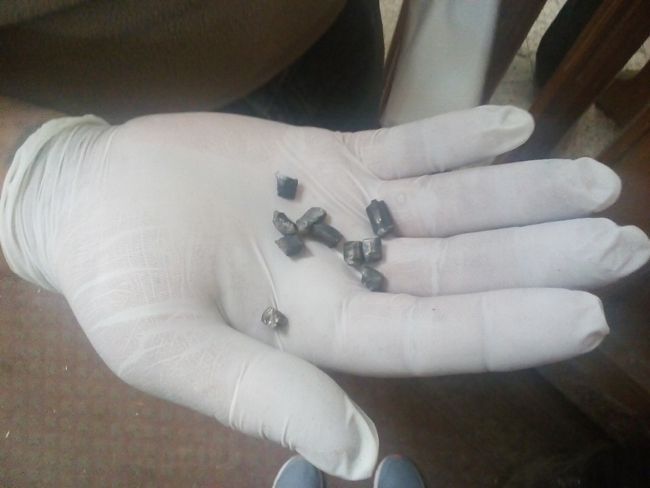
Atef Nemr, one of the church volunteers responsible for ushering duties, holding small fragments from the explosion that he had collected in the morning.(Photo: Hadeer El-Mahdawy)
Final resting place
Not far from the church are the University and Menshawy hospitals, which received most of the casualties after the attack. Both were surrouned with friends and relatives waiting for news of the dead and injured.
We spoke with officials, but they were only able to provide use with figures for the dead and injured. Everyone was busy obtaining permissions for burials, including the manager of the Menshawy Hospital, the security personnel, priests, doctors, and the deputy head of health ministry in Gharbiya, Mohamed Sharshar.
The decision was made to bury all the dead in a small room in the cathedral compound. Workers were busy from the morning onwards, blocking the windows with rocks and cement ahead of the arrival of the bodies.
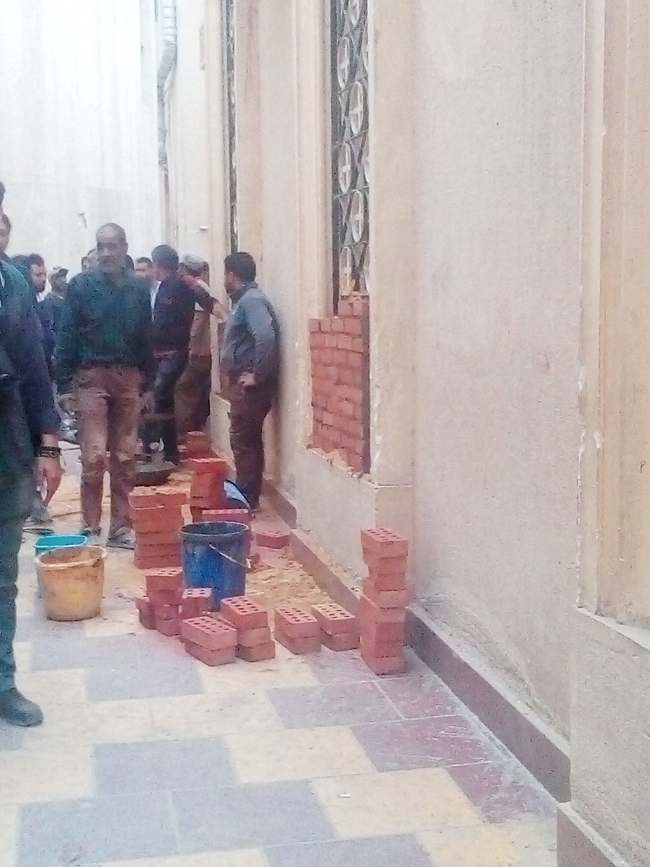
Workers blocking the windows of a room at the church, with rocks and cement ahead of the arrival of the bodies to be burried. (Photo: Hadeer El-Mahdawy)
Sharshar told Ahram Online on Sunday night that perimssions for the burials had been obtained. Meanwhile, 14 of the injured were still in a critical condition and had been transferred to Cairo for surgery. He also said several people had been released from hospital with minor injuries.
"There has been full coordination with the health ministry since the morning," he said. "The minister came to check on the situation, and the ministry provided us with all necessary blood and equipment. Many ministers and the Gharbiya governor were also here for coordination."
In a coffee shop near to the cathedral, locals sat watching the big TV screen, following El-Sisi's speech and the news of the bombing, which had taken place just a few metres away. The coffee shop later became a press centre, where the journalists gathered to file their photos and stories.
By the end of the day, a crowd of people, both Muslim and Christian, gathered in front of the cathedral with their children, holding candles in honour of the victims. Then the prayers for the dead started, and the fallen were carried to their final resting place.
Short link: